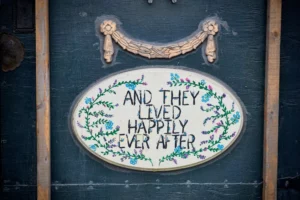I spent lots of time as a single in coffee shops.
Occasionally, if I was lucky, it was on a date. More often — much more often, like, maybe 100 to 1 more often — I was alone, trying to make sense of my life and my emotions and my frustrated expectations. I spent myriad evenings pouring those feelings into journals, often as I looked around at others in the coffee shop who appeared to have less existential angst than I did.
Chief among those feelings was loneliness. I longed with every fiber of my being to be married. But it kept not happening. As my sojourn as a single stretched into my 30s, at times those unmet desires for companionship, camaraderie and intimacy felt crushing, and the void of loneliness inside felt like a black hole that would never be filled.
I knew, of course, as every Christian single has been told at some point, that no relationship, not even marriage, can completely fill that vacuum within, that only God can fill the deepest spaces of our hearts. On an intellectual level, I agreed with that idea. It was, after all, theologically accurate. To believe otherwise is to court idolatry. Still, it was hardly a theological truth that gave me much comfort when I felt squeezed in the vice grip of loneliness.
I did get married eventually, at 34. Since then, my wife and I have had seven-and-a-half fulfilling years of marriage that have seen the arrival of three little ones. That said, I sometimes still experience pangs of loneliness. The shape and character of that feeling is in some ways similar to what I experienced as a single. And in some ways it’s different. And today I’d like to reflect, briefly, on my experience of loneliness in these two seasons of life.
As a single, loneliness is driven by the fundamental reality that we are, in a very real way, alone. And that sense of isolation is compounded by uncertainty: Will I ever find someone? Will anyone ever take the time and the chance to get to know me — really get to know me? And when they do, will they keep loving me anyway? Or will they decide I’m not worth the effort or the risk, that I’m too damaged, too neurotic, too insecure, too generally messed up to bother with?
The flip side of these feelings is, of course, hope — the hope that once we find someone who does love us unconditionally (most of the time, at least), we’ll never again have that gnawing sense of aloneness or nagging doubts about our self-worth. Even if we give intellectual assent to the truism that only God can fill us completely, I think that many (if not most) singles still cling subconsciously to the idea that marriage will completely fulfill us. But sometimes it doesn’t. And that can induce feelings of loneliness, too.
So what does loneliness in marriage look like?
For starters, let me clarify that I’m talking about loneliness in a healthy marriage, not one that’s abusive or dysfunctional. My wife and I have a solid relationship built on a foundation of affection, respect and mutuality. We love each other. And we like each other.
That said, there are still times I feel lonely. They might come in the midst of conflict or misunderstanding. My wife, for example, is an internal processor. I sometimes have a sense that there’s something we need to work through, but she may not be ready to do that in the moment. I have to give her space to communicate in her time — not mine. I can feel pretty alone in those moments. Other times, by the time we’ve taken care of the household’s most basic tasks — feeding, bathing and clothing our children — and discharged our work responsibilities, there’s very little energy left over for each other. We’ve had more than a few date nights that were less like two cherished soul mates staring lovingly at each other than two zoned-out zombies struggling to find a single word to say. Those are lonely moments.
My point here is not to pour cold water on anyone’s dreams of marital and familial fulfillment. Rather, it’s to acknowledge that even when we’re granted the deepest desires of our hearts, sometimes we still run into “cold spots” in our marriages — just as happens when you swim across a lake on a warm summer day. In some ways, that can be deeply unsettling, especially if we’ve somehow unconsciously embraced the notion that marriage means we weren’t ever supposed to feel those things again.
Whether we’re single or married, though, the remedy for loneliness is the same: talking honestly to God about our feelings of disconnect and isolation. We may not immediately feel the burden of loneliness lift. But doing so at least gives God a chance to meet us in those hard spaces, which I believe He longs to do. Indeed, sometimes He is the only one who can reach us there.











